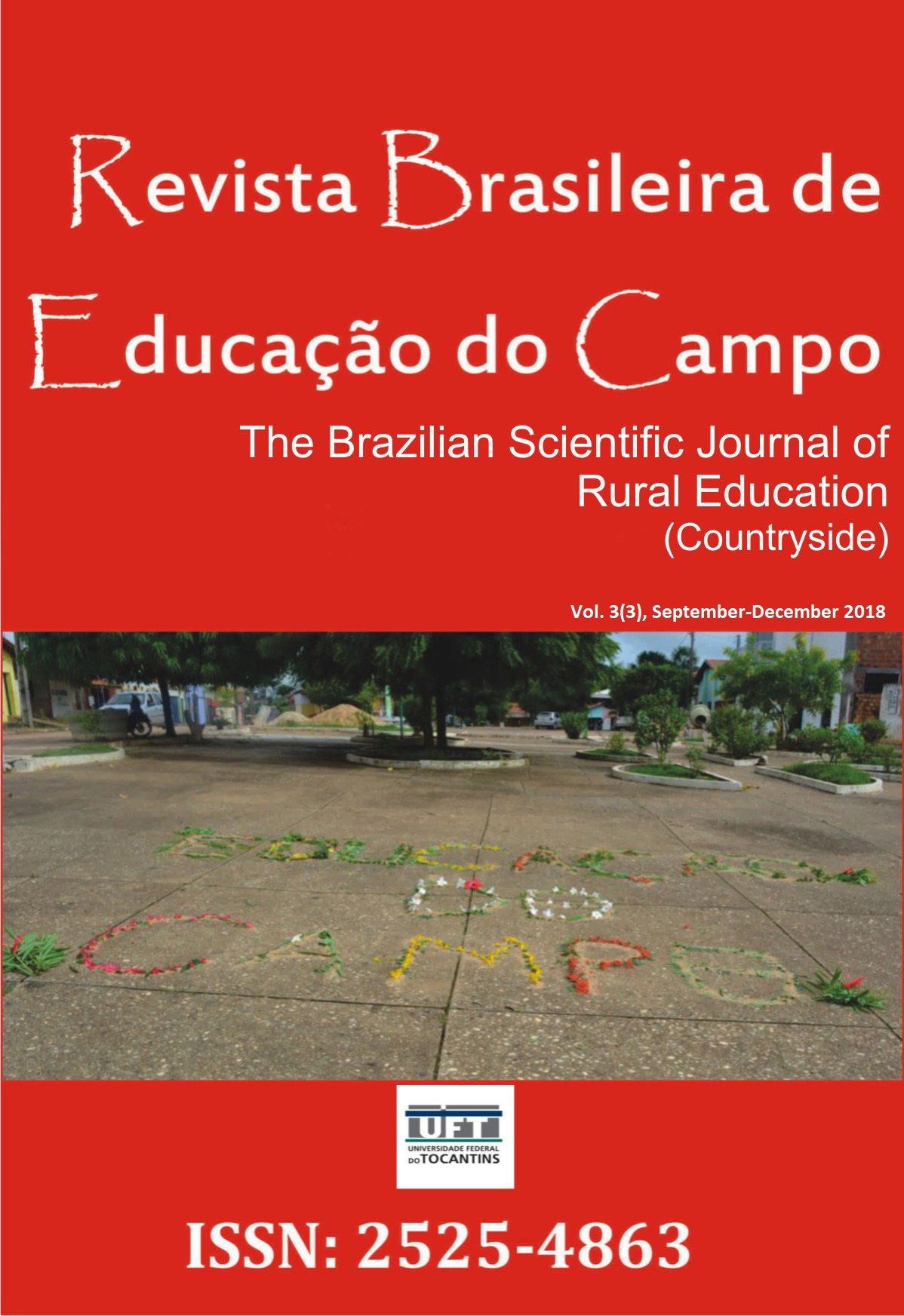Life stories called to the training processes of a rural school teacher from the Restinga Sêca/RS
DOI:
https://doi.org/10.20873/uft.2525-4863.2018v3n3p949Abstract
ABSTRACT. This article is about a dissertation from a Master's Dissertation in Education by the Federal University of Santa Maria/UFSM and arises from the interest in researching as the life story of a literacy teacher, who works in a school in the countryside of the municipality of Restinga Sêca/RS, is related to his formative processes as a teacher. It seeks to bring the literacy teacher closer to her memories of personal and professional life trajectories. The research is qualitative according to studies of Bogdan and Biklen (1994), using the methodology of life history. The instruments that were part of the data collection are the semi-structured oral and written interview, field diary records and the autobiographical accounts. Among the authors who made the theoretical contribution in this work are: Arroyo (2004), Bosi (1999), Caldart (2004), Freire (1996), Nóvoa (1988), Tardif 2002), Souza (2006), and others who collaborate for studies on teacher education, life histories and rural education. Concluding this work, it is possible to give visibility and possibility to this teacher who works in rural areas, to revisit her training processes and to feel valued before the work she does.
Downloads
References
Abrahão, M. H. M. B. (2003). Memória, narrativas e pesquisa autobiográfica: história da educação. ASPHE - FaE - UFPEL, (14), 79-95.
Antunes, H. S. (2004). Processos de formação e memória docente. In Dubal, A. M., et al. (Orgs.). Ciclos de vida pessoal e profissional na trajetória docente (pp. 42-60). Santa Maria: Pallotti.
_____. (2010). Ser aluna e ser professora: um olhar para os ciclos de vida pessoal e profissional. Santa Maria: Editora da UFSM.
_____. (2001). Ser aluna, ser professora: uma aproximação das significações sociais instituídas e instituístes construídas ao longo dos ciclos de vida pessoal e profissional (Tese de Doutorado). Universidade Federal do Rio Grande do Sul, Porto Alegre.
Arostégui, J. (2006). A pesquisa histórica: teoria e método. São Paulo: Edusc.
Arroyo, M. G. (2000). Ofício de mestre:i magens e auto-imagens. Petrópolis: Vozes.
_____, M. G., Caldart, R. S., & Molina, M. C. (Orgs.). (2004). Por uma educação no campo. Petrópolis: Vozes.
Bogdan, R., & Biklen, S. (1994). Características da investigação qualitativa. In Investigação qualitativa em educação: uma introdução à teoria e aos métodos (pp. 40-58). Porto: Porto Editora.
Bosi, E. (1999). Memória e sociedade: lembranças de velhos. São Paulo: Companhia das Letras.
Brandão, C. R. (1983). “Casa de Escola”: cultura camponesa e educação rural. Campinas: Papirus.
Brasil. (1996). Lei n. 9.394, de 20 de dezembro de 1996. Lei de Diretrizes e Bases da Educação Nacional. Brasília, DF.
Caldart, R. S. (2004). A escola do campo em movimento. Petrópolis: Vozes.
Freire, P. (1996). Pedagogia da autonomia: saberes necessários à prática educativa. Rio de Janeiro: Paz e Terra.
Huberman, M. (1992). O ciclo de vida profissional dos professores. In Nóvoa, A. (Org.). Vidas de professores (pp. 14-34). Porto: Porto.
Imbernón, F. (2000). Formação docente e profissional: formar-se para a mudança e a incerteza. São Paulo: Cortez.
Kolling, E. J., Nery, I. J., & Molina, M. C. (Orgs.). (1999). A Educação Básica e o Movimento Social do Campo (pp. 36-52). Brasília: UnB.
Meurer, A. C. (2010). Projeto Político Pedagógico Escolar: Questões a serem refletidas nas Escolas do Campo. In Matos, K., & Wizniewsky, C. R. F., et al. (Orgs.). Experiências e Diálogos em Educação no campo (pp. 1-17). Fortaleza: Edições UFC.
Nóvoa, A. (2009). Os professores e as histórias de sua vida. In_____. (Org.). Vidas de professores (pp. 15-31) Porto: Porto Editora.
_____; Finger, M. (Org.). (1988). O método (auto) biográfico e a formação. In Cadernos de Formação I (pp. 85-98). Lisboa: Pentaedro.
_____. (2009). Professores: imagens do futuro presente. Lisboa: EDUCA.
Pardal, L., & Correia, E. (1995). Métodos e técnicas de investigação social. Porto: Areal.
Projeto político pedagógico da Escola Municipal Dezidério Fuzer. (2015). Restinga Sêca, RS.
Queiroz, M. I. P. de. (1988). Relatos orais: do “indizível” ao “dizível”. In Simson, O. R. M. (Org.). Experimentos com histórias de vida (pp. 21-39) São Paulo: Vértice.
Schön, D. A. (1992). Formar professores como profissionais reflexivos. In Nóvoa, A. Os professores e a sua formação (pp. 14-29) Lisboa: Dom Quixote.
Souza, E. C. (2006). A arte de contar e trocar experiências: reflexões teórico-metodológicas sobre história de vida em formação. Revista Educação em Questão, 25(11), 22-39.
Tardif, M. (2010). Saberes docentes e formação profissional. Petrópolis: Vozes.
Published
How to Cite
Issue
Section
License
Proposal for Copyright Notice Creative Commons
1. Policy Proposal to Open Access Journals
Authors who publish with this journal agree to the following terms:
A. Authors retain copyright and grant the journal right of first publication with the work simultaneously licensed under the Creative Commons Attribution License that allows sharing the work with recognition of its initial publication in this journal.
B. Authors are able to take on additional contracts separately, non-exclusive distribution of the version of the paper published in this journal (ex .: publish in institutional repository or as a book), with an acknowledgment of its initial publication in this journal.
C. Authors are permitted and encouraged to post their work online (eg .: in institutional repositories or on their website) at any point before or during the editorial process, as it can lead to productive exchanges, as well as increase the impact and the citation of published work (See the Effect of Open Access).















